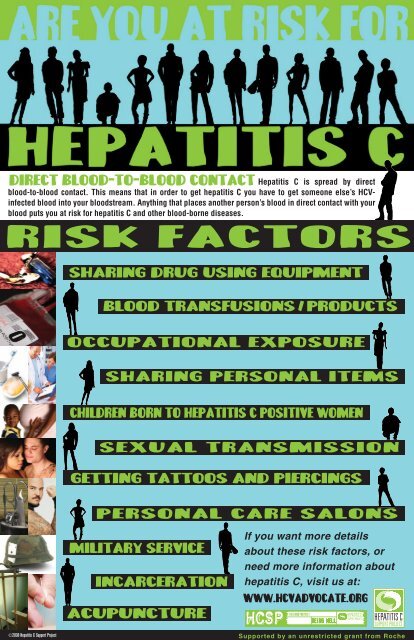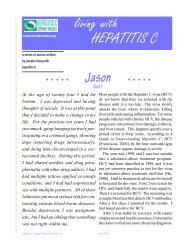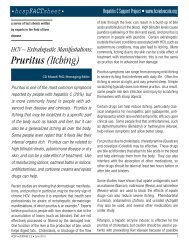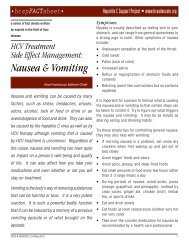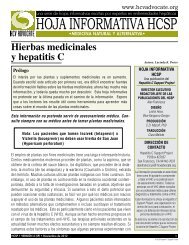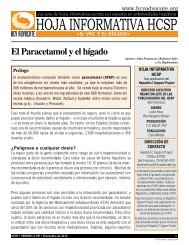Are You At Risk Poster (8 1/2 x 11) - HCV Advocate
Are You At Risk Poster (8 1/2 x 11) - HCV Advocate
Are You At Risk Poster (8 1/2 x 11) - HCV Advocate
Create successful ePaper yourself
Turn your PDF publications into a flip-book with our unique Google optimized e-Paper software.
Direct blood—to—blood contact<br />
Hepatitis C is spread by direct<br />
blood-to-blood contact. This means that in order to get hepatitis C you have to get someone else’s <strong>HCV</strong>infected<br />
blood into your bloodstream. Anything that places another person’s blood in direct contact with your<br />
blood puts you at risk for hepatitis C and other blood-borne diseases.<br />
Sharing drug using equipment<br />
Blood transfusions / products<br />
Occupational exposure<br />
Sharing personal items<br />
Children born to hepatitis C positive women<br />
Sexual transmission<br />
Getting tattoos and piercings<br />
personal care salonS<br />
Military service<br />
Incarceration<br />
Acupuncture<br />
If you want more details<br />
about these risk factors, or<br />
need more information about<br />
hepatitis C, visit us at:<br />
WWW.<strong>HCV</strong>ADVOCATE.ORG<br />
©2008 Hepatitis C Support Project<br />
Supported by an unrestricted grant from Roche
If you want more details about these risk factors, or need more<br />
information about hepatitis C, visit us at:<br />
WWW.<strong>HCV</strong>ADVOCATE.ORG<br />
<strong>HCV</strong> ADVOCATE<br />
Sharing drug using equipment Sharing equipment for injection and non-injection drugs, such as needles,<br />
cottons, cookers, ties, straws, pipes and even water are some of the easiest ways to get hepatitis C. Even the smallest amount of blood that<br />
you may not be able to see can transmit the virus. If you have ever injected street drugs or shared a needle or works with another person<br />
– even just once – you should be tested for hepatitis C.<br />
Blood transfusions / products Before 1992, many people contracted hepatitis C through blood or<br />
blood product transfusions. If you had a medical procedure before 1992 where blood or blood products were used you could have been<br />
at risk and should be tested. Now the blood supply is screened for hepatitis C.<br />
<strong>You</strong> should be tested for hepatitis C if you have had:<br />
• Medical and dental procedures performed in some foreign countries<br />
• Blood clotting factors before 1987<br />
• Hemodialysis<br />
Occupational exposure Health-care workers who come in contact with blood are at risk for getting hepatitis C<br />
and should be tested. The most common cases of transmission occur in needle-sticks with large hollow-bore needles. If you were exposed to<br />
any hepatitis C-infected blood you should be tested.<br />
Sharing personal items If you come in contact with hepatitis C-infected personal hygiene items such as razors<br />
and toothbrushes there is a risk that you could have been exposed to the hepatitis C virus. Although this transmission route is rare, ask<br />
your doctor or nurse if you should be tested for hepatitis C.<br />
Children born to hepatitis C positive women If your mother is <strong>HCV</strong> positive you should be tested.<br />
Sexual transmission Sexual transmission of hepatitis C is uncommon. People who are in a stable, long term<br />
monogamous relationship are at a low risk of getting hepatitis C from their sexual partner. However, in some so-called high risk groups,<br />
including people who have unprotected sex with multiple partners or have sex with someone with a sexually transmitted disease, the risk<br />
of getting hepatitis C is higher. Most government agencies do not recommend routine testing for someone who falls into a high risk sexual<br />
category or for someone having unprotected sex with an <strong>HCV</strong>-infected steady partner. However, if you are worried about sexual transmission<br />
and would like to get tested, talk with your medical provider.<br />
Getting tattoos and piercings If you ever received a tattoo or piercing in an unsafe setting you should<br />
be tested for hepatitis C. Most commercial tattoo parlors follow standard safety precautions and make sure that only new needles and a<br />
separate ink pot are used for each consumer. In other settings, such as in a prison or on the street, the chance of getting hepatitis C is<br />
higher. If you think that you were put at risk, get tested.<br />
Personal Care Salons If you have your calluses shaved, cuticles cut or any other procedure done<br />
where skin is broken you should be tested for hepatitis C. In many states these types of procedures are now illegal.<br />
Military service There is a high prevalence of <strong>HCV</strong> in Veterans, especially in those who served in combat<br />
during the Vietnam War. If you believe that you were put at risk for getting hepatitis C contact the Veterans Administration or your<br />
regular doctor or nurse about being tested for hepatitis C.<br />
Incarceration People who have been incarcerated have higher prevalence rates of hepatitis C. If you have ever<br />
served time in prison or been confined to a mental institution you should talk to your doctor or nurse about being tested for hepatitis C.<br />
Acupuncture If you get acupuncture, the same safety precautions apply as with any procedure where there is a possibility<br />
of blood exposure. Only new acupuncture needles should be used for each client, and your acupuncture provider should take safety precautions<br />
against spreading hepatitis C.<br />
©2008 Hepatitis C Support Project<br />
Supported by an unrestricted grant from Roche


